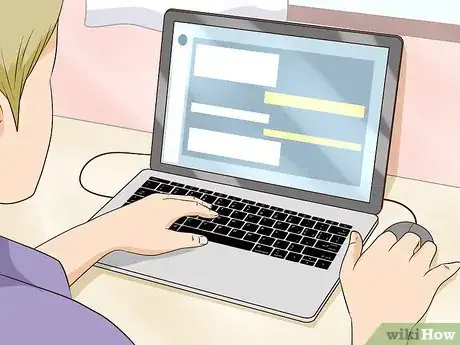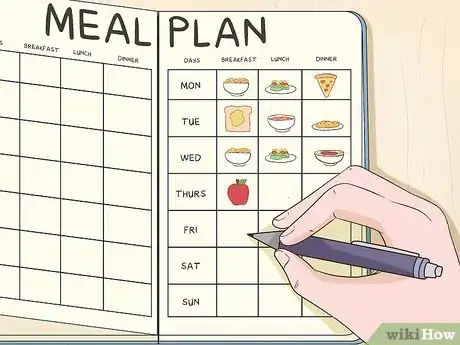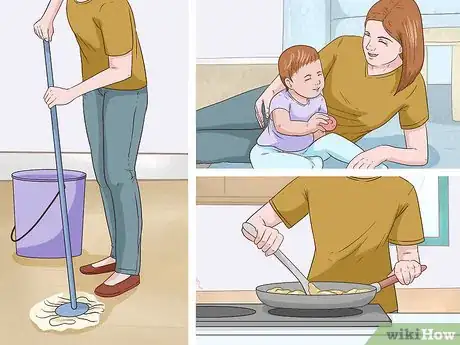This article was co-authored by Michelle Jacoby and by wikiHow staff writer, Janice Tieperman. Michelle Jacoby is a Matchmaker, Dating Coach, and the Founder and CEO of DC Matchmaking, a privately owned, boutique matchmaking company based in Washington, DC, Maryland, and Virginia. She is also the Co-Founder of The Matchmakers Alliance, an international industry organization for matchmakers. With over 12 years of experience, Michelle specializes in one-on-one matchmaking and group coaching to help singles find healthy, lasting relationships. She has been featured in several media publications such as The Washington Post, Self, and NPR. Michelle holds a BA in Psychology from George Washington University. She is also a Certified Matchmaker from The Matchmakers Institute as well as a Certified Body Language Expert from The Body Language Institute.
There are 9 references cited in this article, which can be found at the bottom of the page.
wikiHow marks an article as reader-approved once it receives enough positive feedback. In this case, 100% of readers who voted found the article helpful, earning it our reader-approved status.
This article has been viewed 185,773 times.
Spending time away from your partner can be hard, especially if they’re deploying for the military. While this period of solitude can be overwhelming, there are plenty of healthy ways to pass the time. Keep your mind off of your sadness by distracting yourself with daily tasks. If you feel especially isolated, consider reaching out to a friend or family member. Finally, try to maintain both an emotionally and physically healthy lifestyle while your spouse is away.
Steps
Keeping Yourself Distracted
-
1Create countdowns for exciting events. Distract yourself from your partner’s departure by thinking ahead to future events. Use a calendar or an online countdown simulator to mark when a fun event is happening. If your spouse is only away from a short amount of time, try counting down to their return date! If your partner is going to be away for several months at a time, look forward to more upcoming events, like a movie night or party.[1]
- Increase the hype for upcoming events by downloading a countdown app to your smartphone!
-
2Start journaling on a daily basis. Purchase a notebook or journal and aim to write in it each day. Note how you’re feeling each day, as well as what you did throughout the day. Be sure to highlight both the good and the bad. Although it’s important to stay positive, don’t ignore your sadness and negativity.[2]
- Form a habit at the same time each day.
Advertisement -
3Enroll in community college if your spouse will be gone for a long time. Take the time to expand your education by registering for classes at a local community college or university. Having a structured class schedule gives you plenty of things to study and work on, and will help you keep your mind off of your spouse being away. If you don’t want to commit to a degree program, try looking up some free online classes instead![3]
- If you’d prefer to study from home, there are plenty of online degree programs for you to consider.
-
4Work on your fitness goals while your spouse is away. Stay active by going to the gym or engaging in your favorite physical activities. Set a goal for yourself, like running a 5K or marathon. Developing a workout schedule also fills up your day, giving you less time at home to notice your partner’s absence.[4]
- Exercise also releases endorphins, which are chemicals in your brain that make you feel happy![5]
Staying Connected
-
1Schedule a time to talk with your spouse. Talk to your spouse ahead of time and see if there’s a good time for you guys to chat regularly. If your partner is only away on a week or month-long work trip, try picking a time to call every day. If your spouse is deployed, ask them when they’ll have free time to call. Don’t be surprised if you can’t create a consistent schedule to talk, since military deployments are both busy and unpredictable.[6]
- If you can’t talk live, try using an app like Marco Polo to leave messages for one another.
-
2Join a message board with like-minded individuals. Search online for message boards that interest you. If your spouse is in the military, find a message board full of other people in your position. While nothing can replace your partner’s presence, talking and confiding in people who can empathize with your current situation feels very validating. Nevertheless, be mindful of Internet safety, and don’t give any personal information to anyone you don’t know and trust online.[7]
- For example, the website Ringsurf has special forums dedicated to military wives.
-
3Call a friend or family member to stay connected. Dial up a loved one whenever you’re feeling down. While it might feel easier to isolate yourself while your spouse is away, try to resist the temptation. Talking with friends and family can help keep you grounded during a tough time.[8]
- As sad as it is when a spouse is away, remember that there are plenty of people close by who also love and care about you.
-
4Plan an outing with your friends to get yourself out of the house. Get some fresh air by planning an outing with a friend. See if any of your pals are interested in meeting up at a restaurant or shopping center. The place itself doesn’t matter—what’s really important is that you’re making an effort to socialize and interact with others.[9]
- If you have children, plan a fun outing that the whole family will enjoy, like a movie night or day trip.[10] If you have especially young kids, consider enrolling them in a local play group.[11]
Managing Your Household
-
1Make a meal plan for the week to lessen your stress. Decide your meal schedule at the beginning of the week. While home-cooked meals are delicious, they can add some unnecessary stress to your workload as a temporarily single parent. If you anticipate a certain night being especially busy, plan for pizza, or another form of takeout.[12]
- Deciding on a pizza night ahead of time can also give your kids something to look forward to!
-
2Maintain consistent routines around the house. Try to keep everything as it was before your spouse left. Your kids will have difficulties of their own adjusting to life without one of their parents or guardians around. Whenever possible, keep your weekly schedule the same, like school and after-school activities. Don’t feel the need to change any aspect of your life or your children’s life just because your spouse is away.[13]
- Be open with your kids about what’s going on. If you have younger kids, don’t worry about going into explicit detail—just let your children know that one of their parents will be away for a little while.
-
3Schedule child care for busier work days. Call for a babysitter or enroll your children in daycare if necessary. If you work full-time, it’s difficult and unrealistic to juggle both a career and a stay-at-home position. Child care is a nice compromise that gives your children the supervision they need while also providing you with the freedom to work. Depending on your situation, there are federal programs that can help pay for this, like Child Care Aware of America.[14]
- If you live near an American military base or installation, see if you can register your kids to stay in a Department of Defense childcare facility throughout the day.
Maintaining Healthy Habits
-
1Don’t drink too much alcohol. Feel free to relax and have a drink once in awhile, but don’t rely on alcohol to get you through this tough time. Set a limit for yourself each week and stick to it, especially if you’re planning on going out later in the week. Alcohol is a depressant, and might make your mood decline.[15]
- When meeting up with friends, try suggesting a location that doesn’t revolve around alcohol (e.g., a bar).
-
2Eat plenty of nutritious foods to keep your body healthy. Don’t let your partner’s absence have a physical toll on your daily life. As tempting as it may be to dive into a pile of junk food, try to maintain healthy eating habits. If you eat poorly, it might have a negative effect on your mood, as well.[16]
- Avocados, berries, and apples are all great snack options! To change it up, try putting sliced fruit on toast with peanut butter or cream cheese.
-
3Release your emotions whenever necessary. Don’t be afraid to cry or release your frustration, whether you’re alone or around friends. It’s perfectly okay and even healthy to share your feelings.[17] Similarly, holding your emotions in can have a negative effect on your health. Your friends and family will understand that you’re feeling vulnerable and that you need a supportive shoulder to cry on.[18]
- If you’re really struggling with your emotions during your partner’s absence, consider seeing a therapist.
Expert Q&A
-
QuestionHow do you deal with a traveling spouse?
 Michelle JacobyMichelle Jacoby is a Matchmaker, Dating Coach, and the Founder and CEO of DC Matchmaking, a privately owned, boutique matchmaking company based in Washington, DC, Maryland, and Virginia. She is also the Co-Founder of The Matchmakers Alliance, an international industry organization for matchmakers. With over 12 years of experience, Michelle specializes in one-on-one matchmaking and group coaching to help singles find healthy, lasting relationships. She has been featured in several media publications such as The Washington Post, Self, and NPR. Michelle holds a BA in Psychology from George Washington University. She is also a Certified Matchmaker from The Matchmakers Institute as well as a Certified Body Language Expert from The Body Language Institute.
Michelle JacobyMichelle Jacoby is a Matchmaker, Dating Coach, and the Founder and CEO of DC Matchmaking, a privately owned, boutique matchmaking company based in Washington, DC, Maryland, and Virginia. She is also the Co-Founder of The Matchmakers Alliance, an international industry organization for matchmakers. With over 12 years of experience, Michelle specializes in one-on-one matchmaking and group coaching to help singles find healthy, lasting relationships. She has been featured in several media publications such as The Washington Post, Self, and NPR. Michelle holds a BA in Psychology from George Washington University. She is also a Certified Matchmaker from The Matchmakers Institute as well as a Certified Body Language Expert from The Body Language Institute.
Matchmaker & Dating Coach Focus on spending some time with your group of friends! While there's nothing wrong with missing your spouse, your overall happiness should not depend on 1 person.
Focus on spending some time with your group of friends! While there's nothing wrong with missing your spouse, your overall happiness should not depend on 1 person. -
QuestionWhat do you do when your partner is far away?
 Michelle JacobyMichelle Jacoby is a Matchmaker, Dating Coach, and the Founder and CEO of DC Matchmaking, a privately owned, boutique matchmaking company based in Washington, DC, Maryland, and Virginia. She is also the Co-Founder of The Matchmakers Alliance, an international industry organization for matchmakers. With over 12 years of experience, Michelle specializes in one-on-one matchmaking and group coaching to help singles find healthy, lasting relationships. She has been featured in several media publications such as The Washington Post, Self, and NPR. Michelle holds a BA in Psychology from George Washington University. She is also a Certified Matchmaker from The Matchmakers Institute as well as a Certified Body Language Expert from The Body Language Institute.
Michelle JacobyMichelle Jacoby is a Matchmaker, Dating Coach, and the Founder and CEO of DC Matchmaking, a privately owned, boutique matchmaking company based in Washington, DC, Maryland, and Virginia. She is also the Co-Founder of The Matchmakers Alliance, an international industry organization for matchmakers. With over 12 years of experience, Michelle specializes in one-on-one matchmaking and group coaching to help singles find healthy, lasting relationships. She has been featured in several media publications such as The Washington Post, Self, and NPR. Michelle holds a BA in Psychology from George Washington University. She is also a Certified Matchmaker from The Matchmakers Institute as well as a Certified Body Language Expert from The Body Language Institute.
Matchmaker & Dating Coach Feel free to stay in touch digitally! Shoot them a text, call them up, or even schedule a video call. It's nice to stay connected even when there's a lot of physical distance between you both.
Feel free to stay in touch digitally! Shoot them a text, call them up, or even schedule a video call. It's nice to stay connected even when there's a lot of physical distance between you both. -
QuestionI feel so lonely with my partner away I can hardly eat. I find it hard to sleep at night, and I can't function properly. I miss him so much I can't function.
 Community AnswerYou need a hobby. Take up painting, read a book, start an exercise regiment, etc. If you cannot function without your partner, this is a sign of co-dependence. You need to have your own life. For now, when your partner is away, change up your habits. If you normally eat at the table with him, eat in front of the TV when he's gone. Sleep on his side of the bed or on the couch. This way you won't be quite as attuned to his absence.
Community AnswerYou need a hobby. Take up painting, read a book, start an exercise regiment, etc. If you cannot function without your partner, this is a sign of co-dependence. You need to have your own life. For now, when your partner is away, change up your habits. If you normally eat at the table with him, eat in front of the TV when he's gone. Sleep on his side of the bed or on the couch. This way you won't be quite as attuned to his absence.
References
- ↑ https://www.militaryonesource.mil/family-relationships/spouse/military-life-for-spouses/managing-your-emotions-when-your-spouse-is-deployed
- ↑ https://www.military.com/spouse/military-deployment/dealing-with-deployment/keeping-your-sanity-during-military-deployment.html
- ↑ https://www.military.com/spouse/military-deployment/dealing-with-deployment/keeping-your-sanity-during-military-deployment.html
- ↑ https://www.military.com/spouse/military-deployment/dealing-with-deployment/keeping-your-sanity-during-military-deployment.html
- ↑ https://www.cnn.com/2016/01/13/health/endorphins-exercise-cause-happiness/index.html
- ↑ https://www.todaysparent.com/family/how-to-make-it-work-when-your-partner-is-always-travelling/
- ↑ https://www.today.com/health/military-wives-21-best-tips-dealing-spouses-deployment-I284120
- ↑ https://www.today.com/health/military-wives-21-best-tips-dealing-spouses-deployment-I284120
- ↑ https://www.military.com/spouse/military-deployment/dealing-with-deployment/keeping-your-sanity-during-military-deployment.html
- ↑ https://www.canr.msu.edu/news/planning_frugal_family_fun_activities_to_enjoy_during_the_holidays
- ↑ https://www.militaryonesource.mil/family-relationships/relationships/managing-deployments-and-separations/10-tips-for-parenting-while-your-spouse-is-deployed?inheritRedirect=true
- ↑ https://www.todaysparent.com/family/how-to-make-it-work-when-your-partner-is-always-travelling/
- ↑ https://www.military.com/spouse/military-deployment/dealing-with-deployment/kids-deployed-parents-need-consistance.html
- ↑ https://www.militaryonesource.mil/family-relationships/relationships/managing-deployments-and-separations/10-tips-for-parenting-while-your-spouse-is-deployed?inheritRedirect=true
- ↑ https://www.today.com/health/military-wives-21-best-tips-dealing-spouses-deployment-I284120
- ↑ https://www.today.com/health/military-wives-21-best-tips-dealing-spouses-deployment-I284120
- ↑ https://www.militaryonesource.mil/family-relationships/spouse/military-life-for-spouses/managing-your-emotions-when-your-spouse-is-deployed
- ↑ https://time.com/5163576/ignoring-your-emotions-bad-for-your-health/
- ↑ https://www.todaysparent.com/family/how-to-make-it-work-when-your-partner-is-always-travelling/
- ↑ https://www.militaryonesource.mil/family-relationships/spouse/military-life-for-spouses/managing-your-emotions-when-your-spouse-is-deployed
About This Article
To cope with missing your spouse while they’re away, keep yourself distracted by planning fun events that you can look forward to, like parties or movie nights with friends. You should try to stay connected to your family and friends, since they care about you and can help you feel less lonely. If your spouse is deployed, consider joining an online message board where you can chat with other people with military spouses who can empathize with your struggle. For tips on staying healthy and positive with a fitness routine, keep reading!












































































